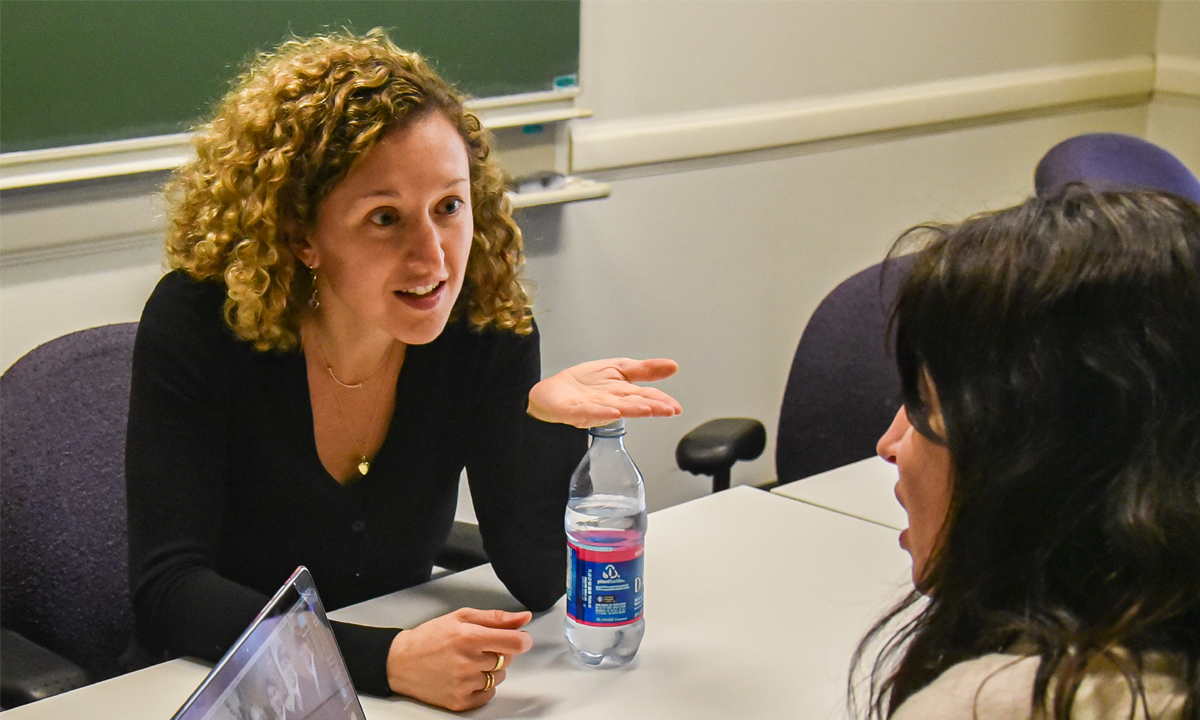
In the intensive care unit, food is an important symbol for the medical staff, providing a way for them to deal with their sadness and anxiety. Food is also a way to offer comfort to grieving families. Daniela Lamas, a pulmonary and critical care doctor at the Brigham & Women's Hospital, thinks a lot about such telling details that she encounters on the job.
She also has a unique chance to explore what they mean and put them into a grander perspective through essays she writes for The New York Times, Atlantic Monthly, and other popular publications. In addition, she recently published a book called You Can Stop Humming Now: A Doctor's Stories of Life, Death, and In Between. Now she will also be sharing her expertise with participants in the new Harvard Medical School postgraduate program, Effective Writing for Health Care.
Shedding Light on Small, But Meaningful, Details
Her writing, which covers a range of topics, always sheds light on small details that have bigger implications, not only for herself and her patients, but also for the society we live in today. For instance, she writes about what happens emotionally to critically ill patients who survive but return home without being able to resume their former lives. She also writes about the loneliness of spending Christmas in the ICU for staff, patients, and families.
In clear, well-structured sentences, she manages to capture the pain of love, loss, fear, and gratitude that often occur simultaneously, deftly untangling the threads for readers so they can follow them at a safe distance to their completion. She also shines a light on the gaps in our understanding of the emotional side of dealing with serious illness and death.
“A lot of these stories were sparked by my own curiosity. I only see patients for a small window of time in the ICU, but I don’t know them before or after,” she explains. Writing gives her a chance to connect with the emotion of the moment in deeper ways and make sense of it all.
Interestingly enough, when she was younger, Lamas never thought about combining her interest in medicine with her passion for writing. While she loved both health care and journalism, she thought she had to pick just one career goal. For her, the choice was clear: to become a doctor.
Exploring the Allure of Writing
“My father is a cardiologist and when I was growing up, he worked at Brigham and Women’s Hospital. I would go on rounds with him there and see what it was like to practice medicine and to see how he handled diagnostic dilemmas, which intrigued me,” she says, adding that she always assumed she would follow in his footsteps.
Yet as she got older, she felt that unmistakable pull toward journalism, too. She wrote for her high school newspaper and in college she served as editor of Harvard’s Crimson newspaper. “Writing was a powerful way to find a built-in community and to find out what’s going on behind the scenes,” she says.
In fact, she was so fascinated by writing—and reporting—that she took a year off following her college graduation and worked as the medical writer for the Miami Herald while she applied to medical schools.
Yet while she loved her job as a reporter, Lamas still couldn’t bring herself to trade in her vision of becoming a doctor to seriously pursue a career in journalism. As a result, she went to medical school, completed her residency, and advanced down her chosen career path. But even as she buried herself in the intensity of her job, writing continued to find her, and she has quietly made space for her two interests to co-exist.
Finding a Way for Writing and Medicine to Co-Exist
“I think of writing as something I do on the side,” she says, admitting that she is always struggling to make both of her passions fit together in the best and most appropriate way. With HIPAA regulations, coupled with her own concerns for the well-being of patients, when she writes, she often walks a fine line between fact and fiction.
Most of her essays also focus on herself and her experiences. This makes it easy to change some of the details of her cases so that her patients’ privacy isn’t compromised, while allowing her to still stay true to the heart of the story she is trying to convey with her writing. But in some cases (such as with her book), she asks for a patient’s permission to share his or her full story.
Further, while she got a positive response from many people she approached for her book, not everyone was on board. “People are often flattered to be included, but sometimes someone says no, they would rather I didn’t tell their story. I have to respect that,” she says.
Using Writing to Gain New Experiences
From a clinical standpoint, she finds that writing helps her gain an even deeper level of empathy for her patients because it allows her to think about what it’s like to walk in their shoes.
“Writing forces you to place yourself in someone else’s position, or to reflect on your own part in the story,” she says. “I hope this has made me a better communicator.”
Writing has also led Lamas to new and exciting opportunities. She recently began serving as a writer on Fox’s television medical drama, “The Resident,” putting her own knowledge to work helping to shape realistic storylines and contributing key details.
“Writing is allowing me to speak to broader audiences. It’s also increasingly becoming who I am and how I am going to contribute to the world,” she stresses.
Written by Lisa D. Ellis


